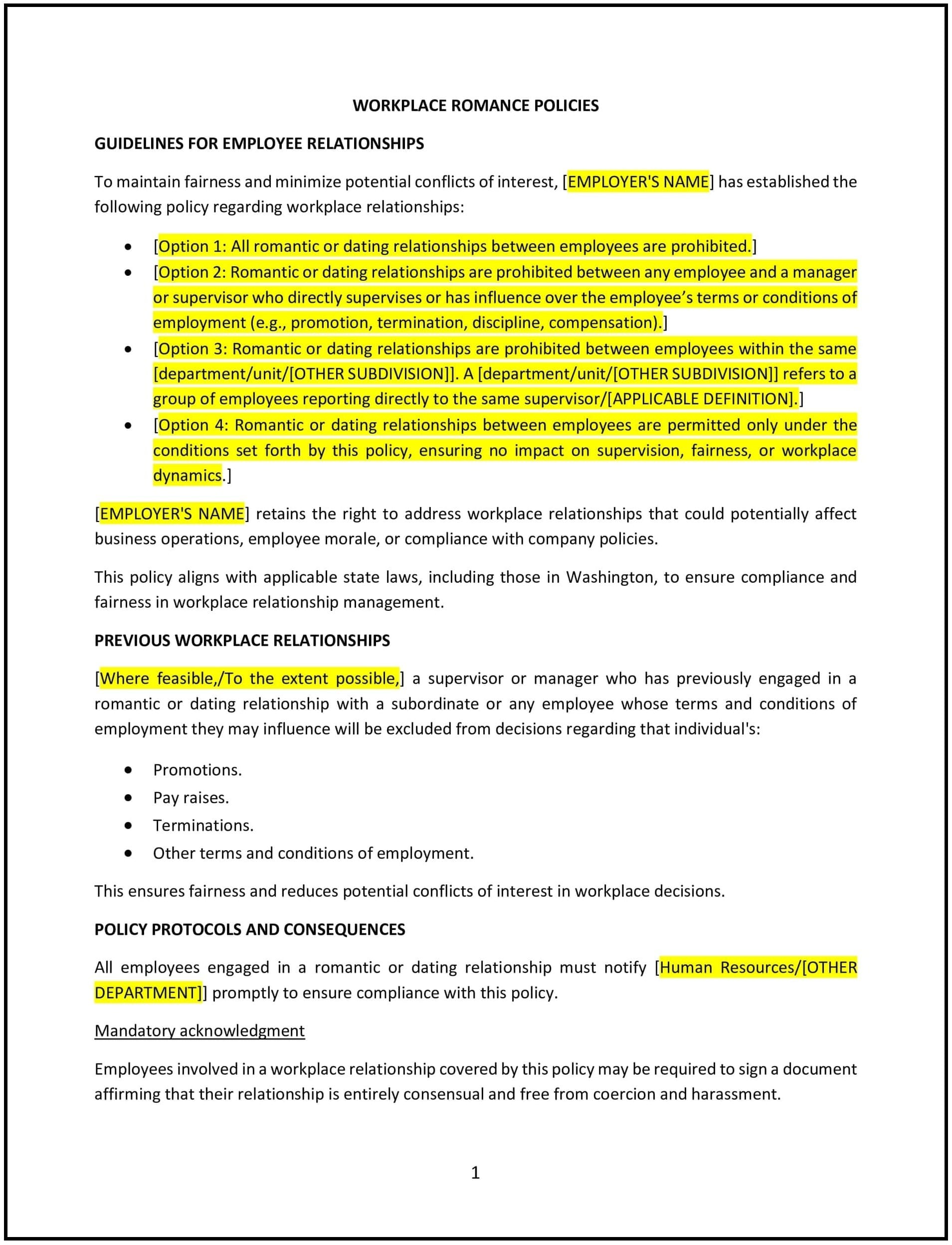Workplace romance policy (Washington): Free template
Got contracts to review? While you're here for policies, let Cobrief make contract review effortless—start your free review now.

Customize this template for free
This workplace romance policy is designed to help Washington businesses manage and address romantic relationships between employees. The policy establishes guidelines for disclosure, potential conflicts of interest, and how the company will handle situations involving workplace romances to maintain a professional, respectful, and productive environment. It aims to prevent the negative effects of workplace relationships, such as conflicts of interest, favoritism, and harassment, while respecting employees' personal lives.
By adopting this policy, businesses can reduce risks associated with workplace romances, promote fairness, and maintain a positive company culture that prioritizes professionalism.
How to use this workplace romance policy (Washington)
- Define acceptable behavior: The policy should clearly define what constitutes a workplace romance and whether any relationships between employees are acceptable, either between employees at the same level or between supervisors and subordinates. It should outline the expectations for maintaining professionalism while engaged in a personal relationship at work.
- Establish disclosure requirements: The policy should specify when and how employees should disclose a romantic relationship, particularly if one employee has direct or indirect supervisory authority over the other. It should clarify that disclosure is necessary to manage potential conflicts of interest.
- Address conflicts of interest: The policy should explain how the company will handle situations where a romantic relationship may lead to conflicts of interest, such as favoritism or the perception of bias. This may include reassignment, changing reporting lines, or implementing other measures to ensure fairness and transparency.
- Prevent harassment and ensure respect: The policy should make clear that relationships must remain professional at work. It should prohibit any form of harassment, whether verbal, physical, or non-verbal, and specify that the company will take action if harassment or inappropriate behavior is reported.
- Provide guidelines for supervisor-subordinate relationships: If the policy allows supervisor-subordinate relationships, it should set specific guidelines on how the relationship will be managed to prevent favoritism and ensure that promotions, raises, and evaluations are fair and unbiased.
- Maintain confidentiality: The policy should emphasize the importance of confidentiality regarding the details of workplace relationships and the steps taken to address them. It should ensure that all personal information is treated with discretion and respect.
- Ensure compliance with Washington state laws: The policy should comply with applicable Washington state laws regarding workplace relationships, including laws prohibiting discrimination and harassment, and any legal requirements for managing potential conflicts of interest.
- Review and update regularly: Periodically review and update the policy to ensure it remains compliant with Washington state laws, federal regulations, and any changes in company operations. Regular updates will help ensure the policy stays relevant and effective.
Benefits of using this workplace romance policy (Washington)
This policy offers several benefits for Washington businesses:
- Reduces conflicts of interest: By requiring the disclosure of romantic relationships and addressing conflicts of interest proactively, the policy helps prevent situations where favoritism or bias could occur, ensuring fairness in workplace decision-making.
- Prevents harassment: The policy clearly outlines unacceptable behaviors and establishes expectations for maintaining a respectful work environment. It helps reduce the risk of harassment and creates a safer space for all employees.
- Promotes transparency: By setting clear guidelines for relationships in the workplace, the policy fosters an environment of openness and transparency, helping employees understand their responsibilities and the company’s stance on workplace romances.
- Enhances company reputation: A well-managed approach to workplace romance reflects positively on the company’s commitment to fairness, professionalism, and employee well-being, improving its reputation as a responsible employer.
- Supports business continuity: By establishing procedures for managing workplace romances, the policy ensures that relationships do not negatively affect business operations, employee relationships, or the overall work environment.
- Maintains a professional environment: The policy helps ensure that workplace romances do not disrupt the company’s professional atmosphere. By maintaining boundaries and expectations, the policy helps balance personal relationships with the need for professionalism at work.
Tips for using this workplace romance policy (Washington)
- Communicate the policy clearly: Ensure that all employees are aware of the workplace romance policy and understand how to disclose relationships, the potential impact on their roles, and the company’s expectations for maintaining professionalism.
- Train supervisors and HR: Provide training for supervisors and HR personnel on how to handle workplace romances professionally, including how to manage potential conflicts of interest and maintain fairness in decision-making processes.
- Address issues early: If a workplace romance is disclosed, address potential conflicts of interest early to avoid misunderstandings or issues that could arise later. Ensure transparency and fairness in how the relationship is handled.
- Protect confidentiality: Ensure that information about workplace romances is kept confidential and only shared with relevant parties, such as HR or senior management, as necessary. This protects employees’ privacy and maintains professionalism.
- Review and update regularly: Periodically review the policy to ensure it remains compliant with Washington state laws, federal regulations, and any changes in the company’s operations. Regular updates will help keep the policy relevant and effective.